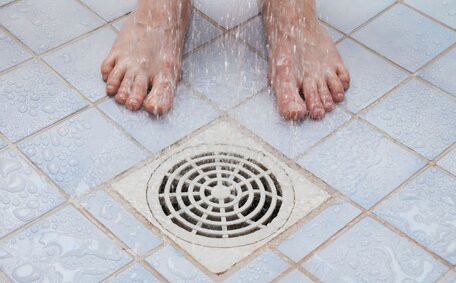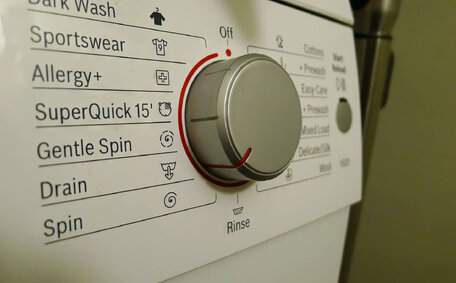
Baking Soda & Vinegar for Cleaning
Using baking soda & vinegar separately for cleaning is very effective; but mixing them dilutes their cleaning power. Learn how to use them properly.
Read MoreTankless water heaters, renowned for their efficiency, are becoming a popular replacement for traditional storage tank models. These systems heat water instantly, eliminating the energy waste of keeping a tank warm continuously.
This on-demand approach increases energy efficiency, potentially leading to cost savings for your hot water system.
Lilyfield Plumbing specialises in the supply, installation, and maintenance of tankless water heaters throughout Lilyfield and nearby Sydney areas.
Our decade of experience with fully licensed and insured plumbers ensures you receive customised advice to match a tankless water heater to your home’s specific needs.
Differing from traditional units, in tankless heaters cold water flows through a heat exchanger, heated by either gas or electricity. This method provides instant hot water at the desired temperature before delivering it to the home’s plumbing and fixtures.
Tankless heaters rely on a heat exchanger that activates only when needed, bypassing the need to store hot water.
These on-demand systems, on the other hand, eliminate standby energy losses associated with tanks designed to supply hot water on a continuous basis. Tankless models offer a continuous, endless supply of your hot water and never run out. They activate only when hot water is needed and can sustain multiple simultaneous demands within their flow capacity.
Gas-powered tankless heaters adapt their output to demand, reducing energy use during periods of low-flow or sporadic usage. The elimination of standby losses and this responsive feature contribute to energy savings that can reach up to 50%, compared with some traditional storage tank units.
Tankless water heaters provide various significant advantages:
Tankless water heaters are appealing for their immediate hot water delivery, superior energy efficiency, and compact design.
A significant advantage of tankless heaters is their capacity to continuously supply instant hot water without a bulky tank. Tankless heaters provide hot water on demand, unlike tank heaters which are limited by their capacity.
Tankless water heaters provide heat directly as water flows through, so you never “run out” of hot water. This makes them the go-to choice for households where the hot water is frequently running out hot during peak times.
Tankless heaters are designed to manage the demands of multiple showers, appliances, and taps using hot water at the same time, catering to household needs. An accurately sized tankless unit will efficiently manage the household’s hot water needs.
Gas tankless water heaters can deliver more energy to heat water per minute than electric counterparts, with output ranging between 3.5 to 10 gallons depending on the model, which can easily meet various household requirements. This high flow rate capacity ensures endless hot water, ideal for scenarios when hot water is in high use simultaneously, like showers or consecutive loads of laundry, giving it a clear advantage over traditional hot water systems. And with advanced flow sensors, tankless heaters regulate their output based on demand, ensuring you’ll never find yourself running out hot water halfway through a shower!
In contrast, a traditional hot water heater with a tank stores between 30 to 50 gallons of pre-heated water. Once this finite supply is depleted, you need to wait for the tank to slowly reheat more water. And if demand exceeds tank capacity, the chance to run out hot water can become a sudden inconvenience.
A tankless system overcomes tank limitations by instantly heating water as needed, providing a never-ending stream tailored to your household’s requirements.
One of the biggest considerations with tankless water heaters is their long-term cost and energy savings, making it unnecessary to worry about the higher initial purchase price compared to conventional storage tank units.
Properly sized gas tankless heaters can slash water heating bills and save money, offering increased efficiency of 30-50% by eliminating standby heat losses. By only heating water when needed, tankless hot water systems reduce heat loss and conserve more energy than traditional tank systems which constantly reheat stored water.
Electric tankless models offer around 20% energy savings, which is less than gas models but still impactful. Heat pump electric tankless units offer greater efficiency.
Maximising cost benefits demands accurate sizing of your tankless unit to align with your household’s regular hot water usage. Oversized systems waste energy through cycling, while undersized ones risk diminished flow. Our qualified plumbers can help choose the proper size and fuel type for your tankless water heater, tailoring it to your household’s needs.
Though initially costlier, gas tankless heaters can offset this through energy savings and reduced maintenance, potentially saving over $700 in a 10-year span. For an eco-friendly solution with an endless supply of hot water that is financially savvy over time, tankless heaters are worth considering.
One of the biggest advantages of tankless water heaters is their space-saving compact design. Comparable in size to a small suitcase, tankless units are markedly smaller than traditional storage tanks, which can take up substantial space.
Slim, wall-mounted tankless heaters can be conveniently installed on any external building wall. Their small footprint is perfect for freeing up extra room in cramped utility closets or small laundry spaces. You can also place portable indoor units in more accessible locations like under sinks.
With storage tanks ranging from 40 to 80 gallons (150-300 litres) and dimensions exceeding 4 ft (1.2 m) tall, tankless models are an ideal solution if space constraints are an issue. Their tiny size but mighty on-demand power can give you the endless flow of hot water your household needs without dominating valuable room real estate.
While tankless water heaters offer numerous benefits, examining the pros and cons tankless water systems is imperative as there are some potential drawbacks to consider:
Gas tankless heaters necessitate appropriate exhaust venting and gas supply lines able to handle increased BTU capacities. We recommend getting quotes from qualified professionals to ensure correct sizing and installation for reliable ongoing performance.
The upfront cost is often the biggest consideration when it comes to deciding whether to install a tankless water heater. Despite typically lower operational costs over time, tankless water heaters have higher initial purchase and installation costs compared to traditional storage tank heaters.
Gas tankless units typically cost between $1000-$3000, inclusive of professional installation, while electric tankless water heaters range from $500-$1500, exclusive of any required electrical upgrades.
Despite the higher initial investment, properly sized gas tankless heaters usually pay for themselves within 3-5 years due to lower energy bills and reduced annual maintenance costs. With estimated energy savings of up to 50% and lifespans over 20 years, they can save over $700 compared to storage tank heaters over a 10 year period.
While the upfront cost can be a roadblock for some households, Lilyfield Plumbing offer tailored advice regarding available rebates, financing options, and long term operating costs to help determine if the initial investment in a tankless heater will pay dividends through years of endless hot water and energy savings.
Optimal performance of a tankless water heater hinges on professional installation and careful planning. There are several key considerations:
With careful planning and professional installation, your tankless water heater can deliver endless reliable hot water to your home for years to come.
Tankless water heaters, though reliable, necessitate routine maintenance to maintain their efficiency. Because they heat water directly, without the buffer of a storage tank, scale and sediment can build up more readily in a tankless system. To prevent this from affecting efficiency and output, annual maintenance is recommended to account for your water use.
At a minimum, a yearly flushing and descaling is needed to remove mineral deposits and scale from the heat exchanger and internal components. Periodic inspections and tune-ups are also important to keep the system running smoothly. During servicing, factors such as water pressure and flow rates can be tuned as needed.
Most tankless gas heaters, with proper maintenance, can provide over 20 years of dependable, efficient operation. At Lilyfield Plumbing, we offer yearly checkups, cleaning, and service plans on all tankless water heater models to keep them working their best year after year.
Selecting an electric or gas tankless water heater hinges on several important factors:
With their superior flow rates and greater energy savings potential, gas tankless models are preferable for larger households with high demand. Electric models work better for low to medium demand households. Contact our experts to determine the best option tailored to your home.
When deciding if a tankless water heater is suitable for your home, the key factors to consider are:
Understanding your hot water needs, our experts can recommend the suitable option, be it tankless or traditional storage tank.
An eco-friendly option, tankless water heaters surpass traditional storage tank models in energy efficiency. Their exceptional energy efficiency leads to lower electricity or gas usage, resulting in reduced carbon emissions and environmental impact.
Gas tankless heaters utilising instant heating instead of storage water solutions produce up to 50% less greenhouse gas emissions than conventional heaters. Electric tankless models have fewer components overall, use less raw materials in production, and conserve energy during operation.
However, gas models do still produce some emissions from natural gas combustion. Regular maintenance is also crucial for sustaining efficiency and preventing negative impacts from scale buildup over time.
Tankless water heaters tend to have significantly longer lifespans than conventional tank heaters. while the average tank water heater lasts 6-10 years, a quality tankless system has an expected operational lifespan of 20 years or longer before requiring replacement.
The durable commercial-grade components allow reliable, maintenance-free operation for over two decades. Without a tank continually degrading from corrosion and sediment, the advanced heat exchangers, control boards and internal parts outlast traditional water heating systems.
With proper annual descaling and servicing to prevent mineral buildup, both gas and electric tankless heaters can provide endless hot water for 20 years or more. This exceptional durability saves money over numerous tank replacements while sustaining efficient performance.
If you’re considering making the switch to a tankless water heater, Lilyfield Plumbing can guide you through the process with tailored advice based on your household’s specific requirements.
Get in touch with our water heating experts via phone, email or by booking an in-home consultation. We’ll conduct water usage assessments to size the system accurately, explain installation factors, outline operating costs over the lifespan, and detail available rebates or financing options.
With over a decade specialising in Installation of a tankless water heaters, our fully licenced team can determine if a tankless water heater is a good fit for your home and hot water needs. We handle full supply, professional installation and ongoing maintenance.
Do not hesitate to call us at Lilyfield Plumbing to discuss whether a tankless system is the right hot water solution for your household and budget.
Using baking soda & vinegar separately for cleaning is very effective; but mixing them dilutes their cleaning power. Learn how to use them properly.
Read MoreBlocked drains are usually caused by buildup of hair, grease, debris and more in your pipes. Fix the problem with professional drain unblocking services to get your drains flowing freely again. Contact us for affordable drain unblocking.
Read MoreWhen you suspect a gas leak or damaged gas line, contact a licensed gas fitter immediately to locate and repair it. A gas line repair involves sealing leaks, replacing corroded or damaged pipes and testing all connections for safety before restoring gas supply.
Read MoreLilyfield, 2040 NSW
We will call back as soon as possible.




